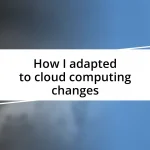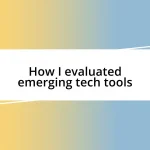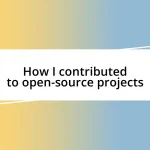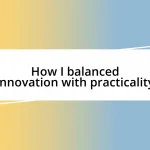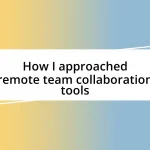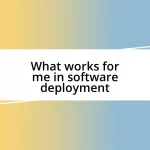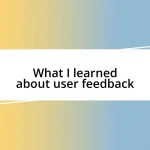Key takeaways:
- The evolution of fintech has empowered individuals, democratizing access to financial resources and transforming traditional banking practices.
- Networking with industry experts and maintaining a growth mindset have been crucial for adapting to changes and embracing new technologies in fintech.
- Measuring success incorporates both quantitative metrics and qualitative feedback, emphasizing emotional engagement and continuous learning among teams.

Understanding fintech evolution
The evolution of fintech has been nothing short of remarkable. I remember the first time I used an online payment app; it felt like a revelation. How did we go from carrying wads of cash to making instantaneous transactions with just a few taps? It’s a testament to how rapidly technology reshapes our daily lives and financial habits.
In exploring this transformation, I often find myself reflecting on how traditional banks once held a monopoly over financial services. I think back to my early career days when we had to physically visit a bank to deposit checks. The idea of accessing account information or transferring funds straight from our phones was, frankly, unimaginable. It makes me realize how much trust we place in technology to manage our finances today.
As fintech has progressed, it hasn’t just changed transactional methods; it has also democratized financial resources. I remember feeling empowered the first time I could invest with just a small amount through a budding smartphone app. Isn’t it exciting how these innovations open doors for individuals who once felt overwhelmed by the financial landscape? The evolution of fintech is not just a story of technology; it’s a journey toward inclusivity and empowerment for many of us.

Identifying key industry changes
Identifying key industry changes has become essential in the rapidly evolving world of fintech. I remember the first time I noticed the shift towards digital wallets and cryptocurrencies; it struck me how these innovations challenged conventional banking norms. It was clear that embracing these changes meant staying relevant, and I had to adapt my own strategies to keep up.
Additionally, regulations have transformed the landscape, requiring all of us in the industry to pivot quickly. When I attended a fintech conference, the emphasis on compliance and security stood out to me. I realized that adapting to these changes not only protects consumers but also builds trust—a vital component in this digital age.
Another significant change I’ve observed is the rise of artificial intelligence in customer service. I was once skeptical about chatbots handling queries, fearing they would lack the human touch. But I’ve changed my perspective after experiencing their efficiency firsthand. It’s fascinating how technology can enhance user experiences and streamline operations simultaneously.
| Key Changes | Impact |
|---|---|
| Digital Wallets | Enhanced convenience and accessibility |
| Regulatory Shifts | Increased consumer trust and protection |
| AI in Customer Service | Improved efficiency and user experience |

Developing a growth mindset
Developing a growth mindset has been instrumental in my journey through the dynamic landscape of fintech. I vividly recall the moment I realized that my ability to adapt and learn was just as critical as my technical skills. This shift in perspective allowed me to embrace challenges rather than shy away from them. I learned that when I encounter obstacles—whether it’s a new technology or a shift in regulations—it’s essential to view them as opportunities for growth.
To cultivate a growth mindset effectively, I’ve focused on several key practices:
- Embracing Challenges: I tackled complex projects head-on, viewing them as chances to expand my skill set.
- Seeking Feedback: I actively sought opinions from colleagues to refine my approach and improve my strategies.
- Learning from Criticism: Instead of feeling discouraged by negative feedback, I embraced it as a valuable learning tool.
- Celebrating Small Wins: Acknowledging my progress, no matter how minor, helped maintain my motivation and enthusiasm.
Fostering this mindset has transformed how I approach every challenge in fintech, making me more resilient and open to learning. Every new development in the industry feels like another opportunity to grow, which excites me and keeps me engaged in my work.

Adopting new technologies
Adopting new technologies can feel like a steep climb sometimes. I remember the first time I integrated a blockchain solution into our projects. Initially daunting, it sparked my curiosity and challenged me to dig deeper into the technology’s potential. I often wondered, “How can I leverage this to create real value?” Embracing that uncertainty proved rewarding as I witnessed firsthand how it streamlined transactions and increased transparency.
There was also a phase when we shifted towards utilizing machine learning algorithms for data analysis. Initially, the sheer amount of information was overwhelming. But I managed to transform that chaos into clarity by breaking down complex processes into manageable steps. I found myself asking, “What insights can these algorithms provide that I might have missed?” Embracing this technology not only enhanced our decision-making but also reignited my passion for data.
Finding the right tools has also been a game changer. I vividly recall my hesitation when a colleague suggested a new customer relationship management (CRM) system. It felt like yet another layer of complexity, but I quickly realized the benefits of automation in managing customer interactions. Reflecting on my journey, it’s clear that my willingness to explore and adopt new technologies has empowered me to stay ahead of the curve, even when it felt uncomfortable. This mindset of openness transformed potential resistance into an eagerness to innovate.

Networking with industry experts
Networking with industry experts has been a cornerstone of my adaptation in the fintech landscape. I remember attending a fintech conference where I met a seasoned professional who shared their journey and insights on regulatory challenges. Listening to their experiences opened my eyes to new perspectives and helped me recognize the value of connecting with those who have been through similar trials.
Building relationships in this industry has involved both online and offline strategies. I found myself reaching out on LinkedIn, engaging with posts, and asking questions that sparked meaningful conversations. One memorable moment was when I asked for advice on managing risk in a specific project. The feedback I received not only clarified my approach but also led to a lasting collaboration that provided mutual benefits for both of us.
I often ask myself, “How can my network propel my growth?” The answers have surfaced during informal coffee chats and structured mentorship sessions. These interactions have imbued me with fresh ideas and genuine support from industry leaders, reassuring me that I’m not navigating these changes alone. Each connection has enriched my understanding and provided guidance as I strive to forge my path in fintech.

Implementing continuous learning
Implementing a culture of continuous learning in my professional life has been pivotal. I recall one late-night discussion with a colleague about online courses that promised to enhance our skills in emerging technologies. We both felt a wave of excitement as we considered diving into topics like artificial intelligence. That night, I made a commitment to dedicate time each week to learning something new, which has profoundly impacted my career trajectory.
As I engaged with these new materials, I often found myself asking, “What if I apply this knowledge immediately?” I took the leap and started implementing small projects that reflected what I was learning, which not only solidified my understanding but also sparked creativity in my work. For instance, after completing a course on digital payment systems, I devised a pilot program that streamlined our payment processing, much to the team’s surprise. That experience became a lesson in how learning in real time can breathe life into theoretical concepts.
Moreover, I realized the importance of sharing what I learn with others. During team meetings, I began to present the insights that sparked my curiosity or strategies I had stumbled upon. It felt gratifying to contribute to a knowledge-sharing culture while also reinforcing my learning. I often wonder, “How different might our discussions be if we all embraced continuous learning?” This approach has fostered not only my growth but has built a collective vigor among my peers, transforming our team into a hub of innovation.

Measuring adaptation success
Measuring adaptation success in fintech isn’t just about tracking figures; it’s about recognizing the qualitative changes in my approach and mindset. For example, I vividly recall when I switched from a purely quantitative evaluation of my projects to incorporating feedback from peers and mentors. This shift in perspective helped me understand that success isn’t solely defined by metrics but also by the growth and collaboration that emerges along the way.
When I think of the tangible aspects of measuring my adaptation, I often reflect on a specific project I led where we sought to integrate a new technology. Initially, I focused on completion rates and efficiency metrics but soon realized I needed to gauge my team’s morale and adaptability as well. Surveying my colleagues revealed that their level of comfort with the new system was just as vital as hitting deadlines. This experience taught me that measuring success includes assessing emotional engagement and satisfaction among team members, which ultimately leads to better results.
It’s fascinating to consider how regular self-reflection has become an integral part of my success measurement. After each project, I take time to ask myself, “What did I learn, and how did I grow?” This practice not only highlights areas for improvement but reinforces the wins, no matter how small they may seem. In one case, I celebrated insights gained from a misstep—such moments reminded me that adaptability and resilience are far more valuable than just keeping a perfect track record.
